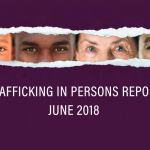
The US Department of State has once again flagged Guyana’s Law enforcement agencies for corruption and bribery, which it says continue to hinder the country’s fight against drug trafficking.
In its annual International Drug Control Strategy Report, the US State Department noted that while the Government does not encourage or facilitate the production or distribution of narcotics or the laundering of proceeds from illegal drug transactions as a matter of policies, its effort to clamp down on the drug problems are hampered by law enforcement officials and political entities.
The report said corruption within law enforcement, bribery, and nepotism in the public sector and political entities further complicate the fight against drug trafficking, adding that the Authorities often drop charges or never file them and do not conduct serious investigations. The report said traffickers are able to evade prosecution.
Additionally, the State Department said that the economic appeal of the drug trade in Guyana, with its high poverty rate and low-paying public sector jobs, leads individuals to become involved in illicit activities and hinders efforts to curb trafficking.
The US Department of State recalled that in two separate incidents in July last year, four GDF ranks were charged with trafficking a total of 213 kilograms of marijuana.
According to the report, in 2024, Guyana seized more than four metric tons (MT) of cocaine, in cooperation with U.S. law enforcement at an airstrip near its border with Venezuela. It was the largest drug seizure in Guyana’s history. There was also the interdiction of one semi-submersible vessel off Guyana’s coast with 2.3 metric tonnes of cocaine.
The report noted that despite growing oil wealth and the Government’s increased efforts, the public sector – including law enforcement and customs officials – remains underpaid.
“Coupled with a lack of adequate resources and shortcomings in the legal system, this allows traffickers to exploit government systems and move illicit drugs through Guyana. Guyana joined the Regional Security System (RSS) in order to enhance its counternarcotics capacity and deepen its integration into regional security,” the report noted.
The US Department said efforts have been made through regional and international partnerships to stem the drug problem, but it has continued overtime.
The report concluded that Guyana’s illicit drug trade contributes significantly to increased crime and corruption. The US State Department is urging the Government of Guyana to step up its fight against drug trafficking by enhancing law enforcement and customs capability through port security improvements, intelligence operations with regional and international partners, implementing stronger anticorruption measures, and strengthening its legislation relating to drug trafficking sentencing, to make it less attractive.
In March, Guyana and the US signed a Memorandum of Understanding, which seeks to deepen security cooperation between the two countries and collectively address challenges confronting the Latin America and Caribbean.
Under the MOU, the two countries will continue to counter narcotics trafficking and transnational organized crime, and it also lays the foundation for Guyana and the United States to strengthen information sharing, increase synthetic drug detection, and ramp up transnational organized crime investigations and prosecution, as well as military to military cooperation.













You must be logged in to post a comment Login